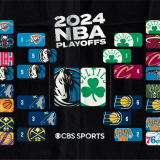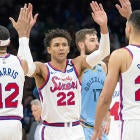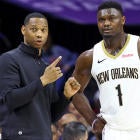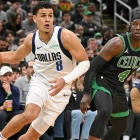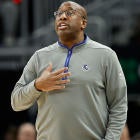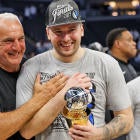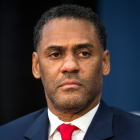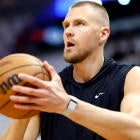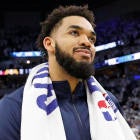Regular-season coaching largely takes place behind the scenes. The implementation of a system and the development of players is invisible work and can largely be judged solely on results that are based on too many factors to calculate.
Playoff coaching, though, is much more of a public chess match. Every minor adjustment counts and rotation decisions can swing entire series. Every slot in a lineup has to be chosen with the utmost care based on the strengths and weaknesses of both the team and its opponent, and when mistakes are made, heads wind up on chopping blocks.
The teams that navigate these roster decisions correctly are the ones that are going to make deep runs in the postseason. The ones that don't are going to have very disappointing springs. So with the playoffs drawing closer and closer, let's take a look at the lineups that matter most to each Eastern Conference contender, starting with the NBA's best team.
Milwaukee Bucks
Most important lineup: Eric Bledsoe, Wesley Matthews, George Hill, Khris Middleton, Giannis Antetokounmpo
Mike Budenholzer left his most dangerous weapon in the holster during the 2019 Eastern Conference finals. As the Toronto Raptors reconfigured their entire defense around walling Giannis Antetokounmpo off at the basket, Budenholzer refused to take the logical counterstep and move Antetokounmpo up to center. As well as Milwaukee's big men shoot, its immobility deprived the Bucks of offensive flexibility. When Plan A failed, there was no Plan B.
Budenholzer has dipped his toes in the water so far this season. Giannis has played nearly 400 possessions at center. The results should shake the rest of the NBA to its core. Their 118.9 points per 100 possessions offensively would be the greatest offense in NBA history over a full season, per Cleaning the Glass. The 94.1 points per 100 they allow would be the best mark any team has posted since 2004. Adding ball-handling to the floor without sacrificing shooting diversifies Milwaukee's offense meaningfully and insulates the Bucks from another Eric Bledsoe meltdown. Having that much speed on the floor makes their transition game look like an actual herd of stampeding bucks.
The only question entering the postseason is who the Bucks should choose to surround Giannis with. Middleton is an absolute lock. Bledsoe should be, too, unless and until he implodes again. The final two spots are trickier. Pat Connaughton is the most athletic option. Donte DiVincenzo is the best balance of shooting, ball-handling and speed. But Budenholzer tends to trust veterans above all in the playoffs. Matthews and Hill start off in pole position, but matchups and recent play will ultimately dictate the choice.
Toronto Raptors
Most important lineup: Kyle Lowry, Fred VanVleet, Norman Powell, OG Anunoby, Serge Ibaka
The Raptors have survived their minutes without Pascal Siakam by relying on players you've never heard of. Terence Davis and Chris Boucher have NBA futures, but Toronto's own past suggests we won't be seeing much of them in the playoffs. The Raptors played a strict eight-man rotation in the last two rounds of their championship run, and even Powell played those games on a very short leash. Most of Toronto's playoff eight are established. Siakam, Kyle Lowry, Fred VanVleet, OG Anunoby and Marc Gasol will start. Powell and Serge Ibaka get most of the bench minutes.
And that's a problem, because most combinations of those players have struggled without Siakam on the floor. Nick Nurse's favorite iteration, built around his two starting point guards, Anunoby, Ibaka and Patrick McCaw, has been decimated by 8.5 points per 100 possessions. No other non-Siakam group has seen over 100 possessions of playing time, but the ones heavily featuring starters have largely failed.
The five above is a minor tweak on the group Toronto has used so often. Powell's improved shooting adds a sorely needed element of spacing to an offensive fivesome that never scores. Versions of this lineup will include Gasol at center from time to time.
Fortunately for Toronto, it can afford to stack its starters in the rare non-Siakam minutes to come. Almost every lineup featuring their MVP candidate has been dominant. He has played at least 40 possessions with 16 different five-man groups, and 11 of them have outscored opponents by at least 10 points per 100 possessions. The Raptors can play him with anybody and thrive. Staying alive when he sits will be their greatest challenge.
Boston Celtics
Most important lineup: Kemba Walker, Marcus Smart, Gordon Hayward, Jayson Tatum, Jaylen Brown
Boston is in the enviable position of having no glaring lineup weaknesses. Practically every group the Celtics actually use works. Their starting lineup destroys opponents by 14.3 points per 100 possessions, and 10 of their 11 most used lineups have a positive net rating. As badly as they should struggle against bigger opponents, no single matchup has actually caused them significant problems yet this season. They even seemingly managed to solve the Joel Embiid puzzle in holding him to 1-of-11 shooting in an early February blowout.
The one group we largely haven't seen is the combination of their five best players. The Celtics start four of them, but have largely resisted the temptation to swap Marcus Smart in for their center. There's good reason for that. The 6-foot-3 Smart might be the best-equipped Celtic out of that group to defend centers, and that isn't a compliment.
But the downside of Boston's lack of lineup weaknesses is that it has made the Celtics reactive. Rarely do they need to experiment with creative groups because their usual ones almost always work. But controlling a playoff series usually means setting the terms of engagement. The Celtics rarely do so, preferring to beat opponents on their terms. Against the superior competition the postseason presents, that might not always be doable. For all of the limits a five-out Boston lineup would create, it would undoubtedly grant the Celtics control of the court. Such a group would be so skilled and versatile that surviving with a center on the floor, outside of a few outliers, might not be possible.
Miami Heat
Most important lineup: Jimmy Butler, Andre Iguodala, Jae Crowder, Derrick Jones Jr., Bam Adebayo
The Heat are great at building leads. They just don't know how to hold on to them. Miami has the NBA's second-best first-quarter net rating, but those numbers decline with each quarter. They fall to 11th in the second, 19th in the third and, finally, 24th in the fourth. It's an unusual state of affairs for a Heat team that is typically among the best-conditioned teams in basketball, but for whatever reason, Miami has shown no ability to stop anyone late in games.
The trade deadline theoretically equipped the Heat to do so. They survived most of the season with two elite defenders in Butler and Adebayo carrying a roster comprised mostly of shooters and ball-handlers. The deadline acquisitions of Iguodala and Crowder balanced the roster out. Jones, while inconsistent defensively, is so remarkably athletic that his presence in a lineup with four stout defenders amounts to a valuable luxury.
Realistically, the Heat probably aren't going to play all five together. Jones likely loses out to one of the shooters, but the idea that Miami could theoretically throw five defensive giants on the floor at once offers a viable solution to its lead-protection issues. If the other team can't score, it can't come back. Even with Duncan Robinson or Tyler Herro in Jones' place, such a group would remain eminently switchable and athletic.
Iguodala's impact on the Heat defense has already been felt. Crowder has looked rejuvenated in Miami. Whatever combination of that five ultimately winds up in their comeback-killing closing lineup is likely going to be a substantial defensive improvement.
Philadelphia 76ers
Most important lineup: Ben Simmons, Matisse Thybulle, Furkan Korkmaz, Tobias Harris, Al Horford
The Philadelphia 76ers were arguably the best team of the 2019 playoffs ... with Joel Embiid on the floor. They lost to the Toronto Raptors because they were run off of the floor when he needed to sit. The 76ers outscored the Raptors by 89 points in Embiid's 237 minutes of playing time, but were amazingly outscored by 108 points in the 99 minutes he sat.
Last year's roster wasn't conducive to minutes without Embiid. Simmons and Jimmy Butler didn't fit together as non-shooters. The 76ers didn't have a viable backup center. Now they have a second center playing on nearly a max contract in Al Horford. They've fortified their bench shooting with Alec Burks and the improved Korkmaz. As badly as the world wants to see the Simmons-plus-spacing model play out over a full season, the results have been mostly mediocre during the regular season. In over 2,300 Simmons possessions without Embiid, Philadelphia is outscoring opponents by only 2.8 points per 100 possessions.
But in the context of getting outscored by over 100 points in a single series, that doesn't look so bad. The version of this lineup with James Ennis in either Thybulle or Korkmaz's place has fared better, but this version features the best balance between offense and defense. It also preserves Josh Richardson to serve as Embiid's running mate when Simmons goes to the bench. Whatever the group ultimately ends up being, the standard is fairly low here. The Sixers are a championship-caliber team with their best player on the floor. It's just up to Simmons not to mess that up.










